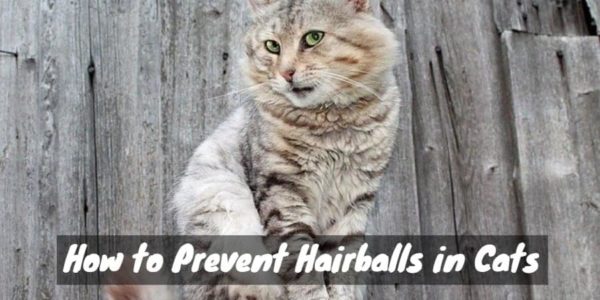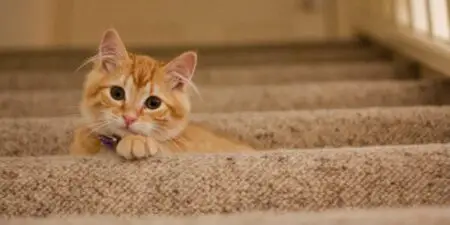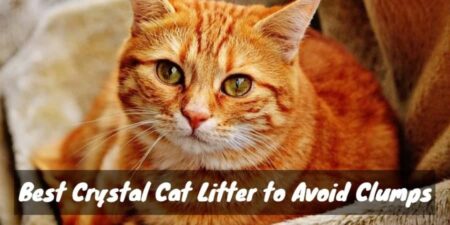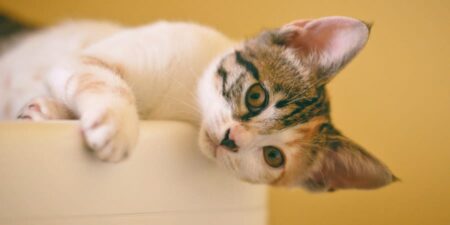You love your cat beyond question, and you accept their strange behaviors, but can you tolerate hairballs? That’s probably your least favorite thing about your cat. You’re not alone in wishing to wage war on hairballs. In fact, 35% of cat-owners said that hairballs were their least favorite aspect of their furry friend.
What Are Hairballs?
Cats often consume hair through grooming, and that hair is passed through the intestinal tract and excreted into the litter box. However, when hair builds up in the stomach and is not digested, it’s spat back up in the form of vomit. This can differ from cat to cat, but often these balls of hair are cylindrical in shape due to the shape of the esophagus.
Cats puke up hairballs just about every week or two. The balls are an inch long, but they can grow up to five inches long. Gross. The balls are also slightly darker in color than your cat’s natural hair. This is due to food and gastric secretions that come up from the digestive system.
When it comes to hairballs, every cat has a different story. Some cats will make loud crying noises when the ball is about to come up, and others will just barf it up without much fanfare. More often than not, you’ll hear loud retching sounds and hacking noises that can be quite disturbing.
Why Do Cats Eat Hair?
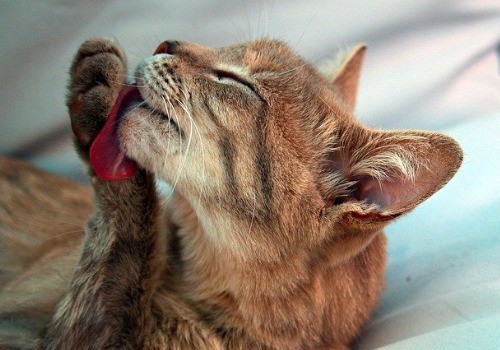
Good question. They’re not eating it as a snack, but cats naturally ingest hair during the grooming process. They keep clean by licking themselves, so naturally they are going to consume some of this excess hair. As you know from your cat kisses, cats’ tongues are quite rough. They’re designed this way because it helps them to remove dirt and loose hair from their coat.
Your cat has the sleek, shiny coat that you love because they constantly groom themselves with their rough tongues. Unfortunately, during this efficient process, your cat is going to consume hair. That hairball is going to have to come up one way or another.
Why Do Some Cats Get More Hairballs?
If you have a long-haired cat, like a Persian or Main Coon, you’re going to get a lot more hairballs in your house. That is simply because they ingest more hair than short-haired cats. When the weather is warm, hairballs are more common, as cats tend to shed their heavy winter coats. Also, some cats just happen to groom more frequently than others.
Are Hairballs a Health Issue?
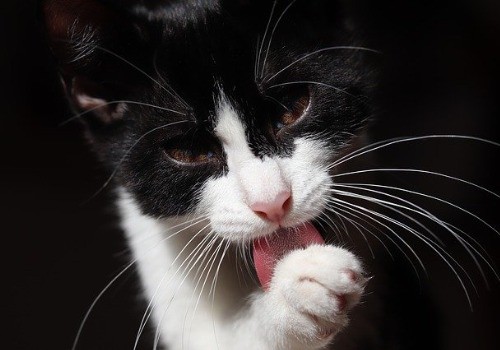
Hairballs are a natural part of cat life, as cats need to get rid of that excess hair that accumulates in their stomach. But, if your cat exhibits frequent wrenching, coughing, and vomiting, then it’s time to take a trip to the vet.
Also, if your cat is constipated, or has an inordinate amount of hair in their stools, loss of appetite, or poor energy, then you should also mention all of this to the vet, as it could be a sign of a bigger problem. If you note a marked increase in hairballs, it could be a sign that your cat has a skin condition that could be problematic.
If you have a serious hairball problem, your vet might order a blood test to make sure that everything is okay with your cat’s liver and kidneys. Sometimes vets also recommend an ultrasound or take x-rays to make sure that there are no major blockages. If a hairball is lodged in the esophagus, it can lead to loss of appetite, elevated heart rate, and increased salivation.
When this occurs, the vet will push the hairball back into the stomach so that it can be processed naturally. Sometimes a laxative is administered to pass the ball. Only in severe cases will surgery be necessary to dislodge the pesky ball of hair.
Management and Prevention of Hairballs
You can definitely minimize the occurrence of hairballs in your cat, and there are three key ways that you can do it. Make sure that you groom your cat regularly in order to reduce the accumulation of hair. When you brush your cat regularly, this will keep them from ingesting loose hair and will lead to less self-grooming. To add to the benefit of this, it is a fantastic bonding time between you and your cat. Be sure to take out that brush and give them a sweep regularly.
The second thing you can do is find a product on the market such as a shampoo or wet wipe that helps to prevent hairballs by minimizing shedding. As with any product, you want to make sure that not only your vet approves of it, but also your cat. You can tell quickly if your cat does not prefer the smell of a certain product, and this should be avoided.
Understand that food choice is very important when it comes to hairball prevention. When you purchase hairball control cat food, it includes natural fiber and balanced nutrients that support your cat’s digestive tract while also nourishing your cat’s skin. When this is successful, it leads to less shedding. There are a number of brands on the market to choose from.
Now that you have a general sense of what causes hairballs, and a few ideas for how to minimize them, we’re going to sum it all up with the top 7 tips for hairball reduction. Hairballs are inevitable, as you now understand, but there is a way to reduce the problem and ensure that your cat is feeling its best.
No one wants these tubular, slimy balls on their floor, and that’s why it’s great to arm yourself with knowledge for less cleanup. Of course, you may not accomplish all 7 of these things because, you know, you have a life. But when you incorporate one or more of these tricks into your arsenal, you’re going to see results that will give you a sense of relief.
Top 7 Tips For Hairball Reduction
1. Brushing

As we mentioned earlier, brushing is perhaps the best thing that you can do to prevent hairballs. This is particularly important during the shedding season. When you remove dead and loose hair from your cat, it means that there is less for them to ingest and less for you to clean up later. Brush your cat as much as possible, no matter their length of hair.
2. Activity
Make sure your cat is staying active with regular playtime. When your cat engages in regular exercise, it keeps their digestive system moving and that means that hairballs have less of a chance to clump. Just like you hit the gym to keep your digestive system humming, so you should encourage your cat to do the same.
3. Gels and Pastes
For everything there is a remedy, and the same goes for hairballs. Purchase a special gel or paste that contains a small amount of petroleum gel or mineral oil in order to lubricate your cat’s digestive system. This allows the hair to pass through more easily. It’s a lot easier to clean hairballs from the litter box than it is from your floor.
4. Special Food
As we already mentioned, special food can help to treat frequent hairballs. This food contains higher amounts of fiber and it pushes the excess hair through the digestive tract. There are also formulations that contain enzymes that help to naturally break the hair down. Check with your vet before switching to a hairball formula food.
5. Fibre Treats
Feeding your cat a fiber-rich treat will help to push that food through, as well. For instance, consider canned pumpkin. This kind of healthy snack will keep the cat’s digestive system humming.
6. Stop Excess Grooming
Excess grooming can be a sign of many things, and for your cat’s own health, on some occasions, it must be discouraged. When you regularly interact with your cat, you decrease your cat’s potential to groom out of boredom or sadness. Excess grooming is a sign of stress, so give your cat a lot of TLC in order to prevent the resulting hairballs.
7. Water
Make sure your cat is drinking enough water. Dehydration will affect the cat’s digestive system, and this leads to increased hairballs. Make sure that your cat has fresh water every day in order to encourage them to drink.
Final Thoughts on Hairballs
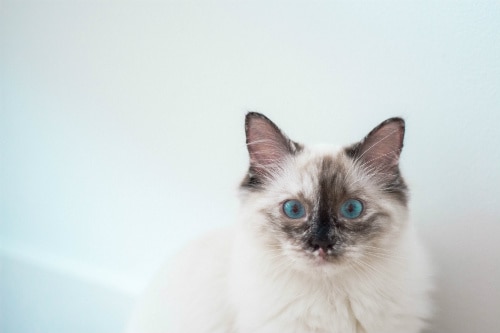
As you can see, hairballs are a part of cat life, but they shouldn’t be excessive. There are a number of things that you can do to prevent this pesky problem from getting out of hand. Should you suspect that your cat has some underlying health issue that is leading to the hairballs, then be sure to take them to a vet to get properly examined.
But, if you’re just experiencing normal hairball expulsion in your home, feed your cat right, give them love, and brush them regularly. A bit of attention and affection goes a long way.
"In ancient times cats were worshipped as gods; they have not forgotten this."
-- Terry Pratchett

